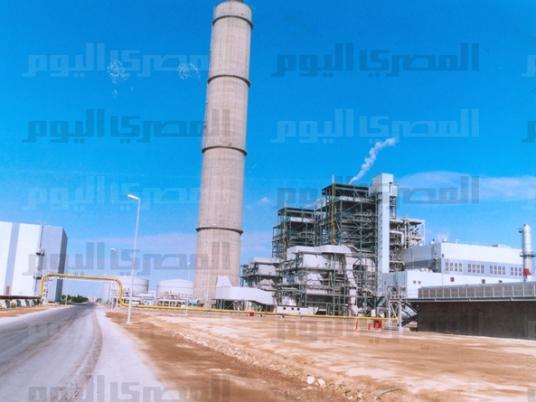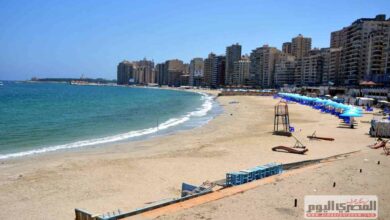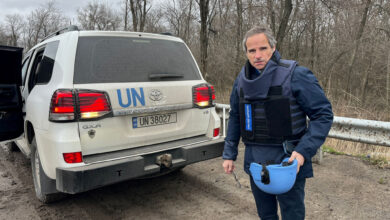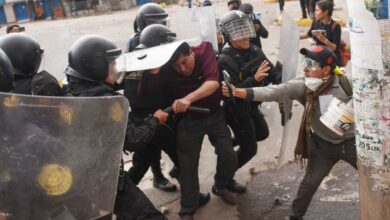
ABU QIR — Raghab Masoud, a 27-year-old employee at Abu Qir power station, was on his way to work when he was killed in clashes Saturday in Abu Qir city, east of Alexandria, after a trigger-happy security officer fired live bullets at hundreds of protesters seeking jobs at the plant.
The officer, Hisham al-Masry, who worked as a white-uniformed security guard at the state-owned plant, was imprisoned and awaits sentencing by the public prosecutor, according to Alexandria’s deputy interior minister. Masoud was due to be married a week later.
Protests at the power plant stretch back over the last year and a half, as the people of Tarh, the village where the plant is located, began asking for their rights to jobs. They feel they earned this right after protecting the plant from theft during the revolution, a common arrangement between big projects and their hosting neighborhoods at the height of the security retreat in January 2011.
A sit-in turns violent
Tarh villagers protested Saturday after attempts to meet with company officials two days earlier failed.
“We’ve been promised jobs for the last year and a half, but nothing has come of it. On Thursday, we went to the plant to try and meet with someone who could tell us what is happening, but were told to get out because the company is not hiring. So our response was to begin a peaceful sit-in outside the plant so that someone responsible could come out and reach an agreement with us,” says Mohamed Ramadan, a 30-year-old participant.
But no company officials came to the scene.
Ali Taha, 19, who runs a cafe opposite the plant with his mother and father and who bore witness to how events unfolded, says it was a peaceful protest.
“There are weapons in the village, but no one brought these to the protest because they know there is an Army presence at the plant,” he says.
Ramadan Masoud, Raghab’s older brother and an employee of the West Delta Electricity Company, also says the protest was peaceful.
“They were peaceful and just waiting for someone from the company to give them their rights after being promised employment,” he says.
The tide turned when the plant’s workers said they would not leave, according to those standing outside its gates, who included the cafe owner and protesters.
They say it turned violent when glass was thrown from behind the black steel gates where workers were standing. Some glass hit lawyer Mohamed Hamed, who was standing with the protesters, causing his head to bleed.
The power plant’s workers, however, say protesters were the antagonists.
“They are thugs who came to destroy the power station in their protest,” engineer Samia Anwar, 51, says. “They were outside and didn’t want to let anyone through. Then they stormed the gates of the plant and started attacking us inside the plant. The first shot was from the protesters, because they wanted to attack the power plant.”
Inside the power plant, behind the gates, there was little evidence of major damage except for broken glass at a security hut.
Outside the gates, an ATM had fallen to the ground and motorbikes were set on fire by plant workers and the security officer, Taha says, to falsely suggest protesters had attempted to set the plant on fire. The ATM’s security camera has been confiscated.
“We used to mock when we saw Jews killing Palestinians, because [the Palestinians] would hit them with stones. Now it’s happening to us, and they call us the thugs,” says protester Khattal Ali, 43.
Masry, the imprisoned officer, is said to have forcibly taken the gun from an Army officer standing next to him. He reportedly got angry at other officers at the plant for not firing at protesters and only into the air as a dispersal mechanism.
Plant workers say they are happy the officer took an active stance in “defending” them. Both sides, however, complain about the lack of measures taken by the Army to control the situation.
Attiya Shaaban, a protester injured by a Molotov cocktail, says the Army did not take responsibility.
“Army officers, including the deputy head of security, were standing by and not doing anything to stop the police officer shooting,” Shaaban says. “The Army said, ‘Nothing is in our hands.’”
“Lieutenants were sitting here and didn’t move. We told them the plant is burning and they said there’s nothing we can do,” plant worker Sayed Mohamed says.
A sense of entitlement
Villagers say they were verbally promised jobs by Electricity and Energy Minister Saad Mahmoud Balbaa, who at the time was chairman of the Egyptian Electricity Holding Company, which oversees a number of subsidiary companies.
These include the West Delta Electricity Company, which runs Abu Qir power plant and whose then-chairman, Gaber al-Desouky, also verbally promised them jobs, villagers say.
Villagers are angry because only 10 of the 100 promised jobs have so far come through, even after they completed the costly process of prerequisite paperwork, such as medical examinations and criminal record checks.
“There is nothing in the law that says companies must appoint from the local area,” says Ahmed Hossam, lawyer at the Egyptian Initiative for Personal Rights. “However, due to unemployment, some governors will sign agreements with companies to appoint a certain number of people locally.”
It is unclear whether Beheira’s governor has signed any such agreement with the West Delta Electricity Company.
The Tarh villagers also describe a process of bribery and nepotism at the plant, in which company managers hire residents of the nearby town of Idku in return for favors.
Idku itself has faced protests against oil and gas companies operating in the area because locals want jobs there as well.
Plant workers say they come from all over Egypt, including Alexandria, Idku and Aswan. Protesters claim that 80 percent of the plant’s employees are from Idku.
Abdel Fattah Saad, who suffered a leg injury at the clashes, reckons that “because Idku is rich with fish resources, which are expensive, company heads hire people from Idku so they can get these things in return. They also hire their relatives from Idku.”
Saad is waiting to be fully employed at the plant after working for two years on a daily temporary basis as a scaffold builder for the Italian company Ansaldo Caldaie, a subcontractor at Abu Qir power plant.
Other subcontractors include China’s Zhejiang Thermal Power Construction Company,Egypt’s Orascom Construction Industries, Mega for Construction and Industries, and the German company DSD Ferometalco.
Chinese workers at the plant, who local residents accused of serving part of their prison terms in Egypt, also have aggravated a sense of employment deprivation among villagers.
At the same time, the villagers complain of severe noise pollution caused by the 4-year-old plant and a lack of services, such as garbage collection, to the impoverished local community.
Desouky, who is now chairman of the Egyptian Electricity Holding Company, put out a statement on the Electricity and Energy Ministry’s website on 26 August. He firmly blames protesters for the plant’s delayed operations and Saturday’s clashes. The statement describes them as “attacking and besieging” the plant.
He adds that just as people began feeling an improvement in the country’s electricity supply, and after frequent power cuts this month, protesters are causing a disruption again.
“Foreigners and experts have pulled out” and protests such as these will cause more power cuts as witnessed this summer, the statement says. The plant was due to start operating in May, but the date was pushed back to August due to protests.
Workers at the plant, however, contradict these claims and are proud of having kept the plant going in such difficult circumstances.
“It is running at its full capacity and workers have done a service to the country by preserving the units to keep them in operation,” engineer Shendy al-Halawany, general manager of the plant, tells Egypt Independent. “We’ve been at the plant for the last three days to preserve it, because it’s our source of bread and one of the most important things for the country.”
Meanwhile, protesters — most of whom are temporary workers for Italian, German and Chinese subcontractors hired by the plant — blame the delays on faulty supplies by these companies.
The clashes put another juncture in the ongoing tension between the villagers and the power plant.
“We want retribution against this officer from the Interior Ministry,” says Ramadan Masoud, whose brother was killed. “During the revolution, I was very sympathetic to the police, but there are clearly forces that don’t want the country to settle. Retribution is what will heal me from the hell we’re living through.”
Mohamed Hamdy, a driver seeking a permanent job at the plant, traces the security problem back to the employment issue.
“The problem will be resolved when the head of security stops work at the company until our jobs issue is resolved,” he says.
This piece was originally published in Egypt Independent's weekly print edition.




